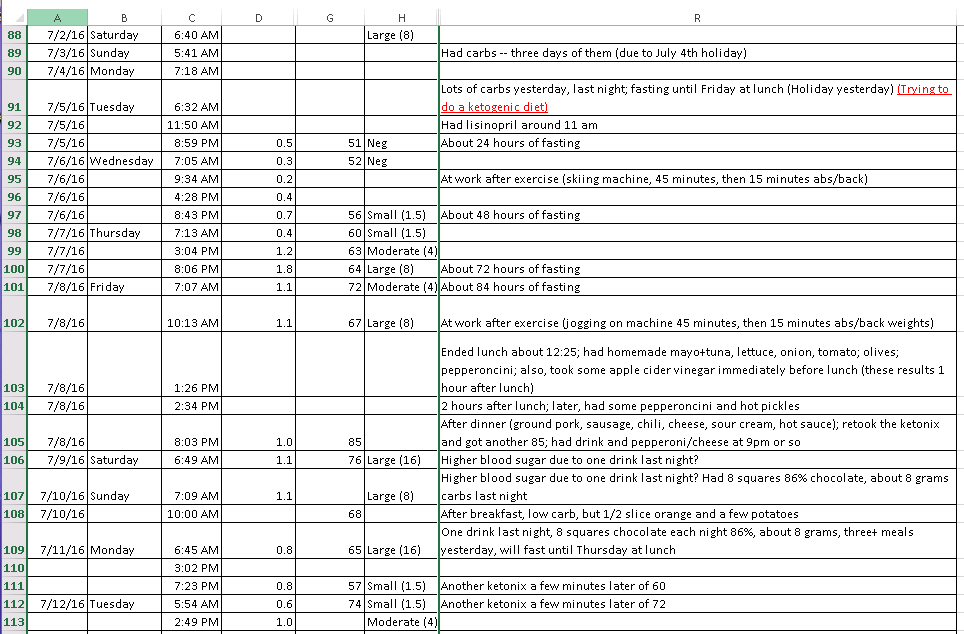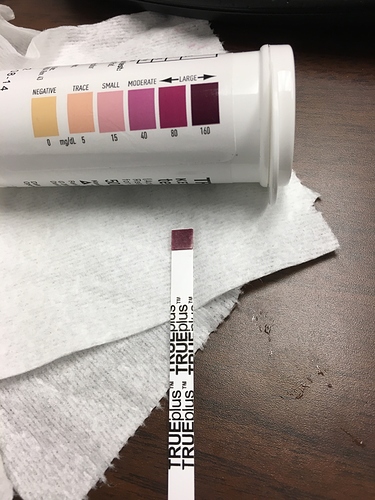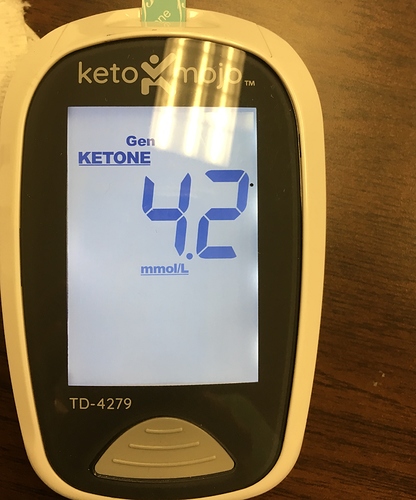From what you’ve said, I would say you’re nicely fat adapted 
Fat Adapted and Still Excreting Ketones in Urine: Survey 🔎
The problem is, we see this all the time: “I did X (say, ate more protein), and my ketones decreased (or increased)”. I can honestly say that, other than fasting for multiple days (raises ketone level), I have no idea what affects my ketone (or blood sugar) levels. (MCT oils might also make ketones rise, particularly breath ketones.) And that’s with 3.5 years of testing, almost 1,900 samples, using urine, breath, and blood, 2 different ketone testers, 6 different blood sugar testers. I personally gave up testing using urine strips years ago, as I had many tests where blood and breath indicated ketones and urine strips said anywhere between no ketones and high ketones. And blood and breath ketones are rarely in synch (unless fasting multiple days).
For instance, I thought eating late at night caused higher morning blood sugar. But I can show you many instances where that is not true. High protein = lower ketones? Maybe, maybe not.
The problem with these measurements for me is that I’ve been low carb/keto 5.5 years. My “high” ketone values now are nowhere close to where they were 3+ years ago. I could see 3.0+ mmol/L BHB back then while eating. I can’t get to that now unless it’s in the evening and I’ve fasted at least 3 days. I am out of ketosis every morning, even fasting 32 hours, if “ketosis” = 0.5 mmol/L.
Moreover, my blood sugar goes up from about midnight to about noon, then down all day until midnight. I can thank my CGM for that realization. And my ketones follow an inverse pattern (lower in the morning and higher at night). So, if I want to test what happens to ketones, I have to make the tests at the same time during the day, otherwise I can’t compare. And even then, the error in testing is quite high, for both ketones and blood.
I’ve reached the conclusion that testing, while interesting, yields little real benefit. I also think high ketones might indicate (if you’re eating) excess energy and therefore, unless you have cancer or some other reason to try for higher ketones, high ketones are bad.
Anyway, here’s some data fof you, from 2016. It goes date, day, time, ketones (blood, Precision Xtra), Ketonix breath value, urine strips, notes. I have not shown many other columns of data (see the column headings): Now, three years later, my ketonix rarely gets above 40, and my blood ketones are rarely above 1.0. Urine has little relationship to blood and breath. (And note that the rows for me are up to 1,886 tests.)
By the way, if you think you see a pattern in this data, I can guarantee I can find data that shows that pattern does not hold all the time.
Ketones and glucose levels are not linear responses to fixed variables. They’re adaptive nonlinear and use history to keep us alive. So while the pattern isn’t clear, it’s a real system and very dynamic.
Instead of thinking of it like a machine with input and output, consider your metabolic system like a guardian AI (or angel) that is trying to plan and predict your future needs while optimizing (minimizing) waste. Maybe instead of artificial intelligence (AI), I’ll call it biological intelligence (BI).
When you measure, you think you’re looking at a reaction to what you did. Your body is way ahead of that… it’s looking at what you’ve done, what you’re likely to do next, what you did yesterday and a week ago around this time. It tracks your food intake (or not), nutrients, macros, enzymes, amino acids… it tracks your activity base needs and likely expenditures. It’s literally a massive parallel GPU supercomputer that is working to keep you conscious and alive and collecting massive data to make intelligent choices.
It’s why I can run at 33 blood glucose while fasting without crashing. My BI has figured out how to give me what I need and sometimes that means 9 blood ketones and sometimes it’s 0.5
And as soon as I’ve locked on to the pattern, it’s already learned more new stuff and adapted again… it’s just WOW
Yeah, I’m quite the talker!  Today - pee strip positive, BK 0.8.
Today - pee strip positive, BK 0.8.
I apologize for this being somewhat verbose, I wanted to summarize the past 3 days since my dental procedure apparently affected my ketosis similarly to alcohol (per @carolT linked below). In my case, though, the anesthesia appears to have take 48 hours to get removed completely, and then the better part of another 24 hours for my ketosis to return to normal again. If anyone else has had a similar experience please post in the other topic linked below. Thanks.
From here: Dentist local anesthetic affect on ketosis 🔎
Within an hour of completion of the dental procedure, my BrAce dropped lower than my normal range and stayed at the lower range for the next 48 hours - Jun 1 at 2 pm. It has gone up again to my normal range, but I had to give it some help by eating raw ginger last night before going to bed and eating some coconut oil today at work.
And as of this morning, BrAce appears to back to normal again.
I just tested urine again, Jun 02::2:30 pm and matched 1.5 mmol/L.
To @Karim_Wassef @PaulL @Shortstuff @Screenack @ctviggen
Reminder that:
Also, not trying to determine why or why not, or whether there is any correlation to other ketones. Questions for another day. 
Wanted to follow up on what Paul is saying, looking at the information cited below, would it not stand to reason that your going to be making more BHB from ketones and thus not really see them on a keto urine strip or on a ketone breathalyzer after three or four years of doing a ketogenic lifestyle; but only see very small trace amounts of ketones; if the liver (is not damaged?) is efficiently converting ketones into BHB; then you would be seeing very small trace amounts of ketones in the 0. something region or range with a ketone blood meter?
My spin on this is, if you have been doing the ketogenic lifestyle for many many years and your still seeing HIGH ketones on a breathalyzer, urine sticks or ketone blood meter when inactive and in a rested state then something might be WRONG?
Possibilities:
-
…your not really doing a ketogenic diet long-term in other words switching back and forth between low and high carb for extended periods of time?
-
…something your eating or taking is inhibiting your long-term ketogenic BHB conversion metabolism in the liver? (i.e. actual and realistic long-term ketogenic fat adaption)
-
…ketoacidosis?
-
…impaired hepatic function; damaged liver or liver disease?
-
…your fasting extensively EF?
Notes:
[1] ”…A healthy liver minimises the acetone lost via the lungs by converting most of the acetoacetate it produces to a more stable substance, called beta-hydroxybutyrate or BHB. And this is where those euphoric feelings could come from. …” Professor Andrew Brown, School of Biotechnology and Bio-molecular Sciences, UNSW
[2] “…Urine strips are generally useless because you can have higher amounts of acetoacetate in your urine because of dehydration or nitrogen overload as well but it doesn’t really tell you much about how well you’re using ketones for energy. …” …More
[3] The three main ketones your body makes from fatty acids are:
- Beta-hydroxybutyrate (BHB) . This is the most abundant, making up to 78% of total ketones in the blood[*].
- Acetoacetate (AcAc). It makes up around 20% of ketones in the blood.
- Acetone The least abundant, making about 2% of ketones in the blood. It’s not used for energy.
Both BHB and acetone are derived from acetoacetate(AcAc), however, BHB is the main ketone used for energy because it’s extremely stable and abundant, while acetone is lost through respiration and sweat.
- D-BHB: This is the one your cells use for efficient energy and its produced in high amounts. It’s responsible for the anti-aging effects of total BHB.
- L-BHB: This one is produced in lower quantities and can’t be used for energy as efficiently as D-BHB. It’s more helpful in the synthesis of fatty acids. …” …More
Studies using ketone salts and esters
Here are my ketone levels taken Jun 1.
Time on keto - 1 year
Strips - Dark red between 80-160 range.
Blood - 3.9 mmol/L
Have been keto for a year and have tested positive for ketones the entire time. I test with the strips every morning and they are usually dark red. I tested my blood ketones frequently for a few months with averages in the mid 3s to 4s. Lows occasionally drop into the 2s and rise into the 5s. The lows correspond mostly with my ‘cheat’ days, but I have not noticed any changes over time.
I reached my current weight of 112 lbs (from 163) in Jan and have since stayed within a couple of lbs (more or less). My ketone levels in maintenance are measuring pretty much what they did during weight loss.
I’ve been keto for over 2 years - never not been in ketosis (tested by blood - usually between 1.5-3mmol). Tested urine out of curiosity recently and ketone in urine corresponds accurately with ketones in blood. I have no idea what’s going on??
4 posts were split to a new topic: Studies using ketone salts and esters
I will test high during a longer fast. Once my BHB goes above 3.0mmol and BRace goes past 75 PPM I will definitely piss out ketones. I have maintained that this was an effective measure of showing how the body is preparing for the ultimate energy emergency by producing excess ketones BUT ridding the body of them quickly if the need for them was not apparent, thus preventing any type of ketoacidosis issue.
I have nothing but n=1 to back that up.
I just tested urine again Jun03::1:30pm at 1.5 mmol/L. Same as yesterday’s reading at about this same time. I had previous taken a BrAce sample about 10 minutes earlier of 11.4 ppm. This is the day’s BrAce low point so far, falling slowly since the day’s peak at 05:25 of 21.8 ppm. I’ve spent the morning fairly inactively and the slowly falling BrAce concentrations are typical, although still within my normal 10-20 ppm range. I expect the concentration to rise during the afternoon and evening while I’m at work expending lots more energy. I will also be swishing a few spoonfuls of coconut oil. 
I don’t believe it because you get a zero reading on the pee strips it’s because one can get widely varying results from no color to purple and not really telling you anything that important. Mostly depending on hydration level. I can tel you the highest blood reading I got I’m the beginning was 1.8 and I no I was tracking all I ate and the pee strips barely turned any color the darkest of which was a light pink. My better half when she tried keto for 2 months had blood readings in the 2+ regularly. So the strips are just unreliable at best. The best thing to do is to track what you eat and as long as your under your carb threshold your in ketosis and burning fat. How well is up to you and your diet.
Also checkout the FASTER study by Volek. Many of the long term fat adapted athletes were showing blood
reading below the .5 range and still were burning the most fat.
First data point from me since I finally picked up some pee sticks.
20 hours fasted on a (hopefully) multi-day fast this week.
Pee stick - between Small and Moderate (15-40)
BG: 75
BK: 1.9
A reminder to @RedThain and any others who either haven’t bothered to read the OP or have forgotten what we’re doing with this survey, allow me to reiterate:
We are testing whether or not this specific claim is true. That’s all. We are NOT testing whether or not the urine test sticks are reliable and/or accurate. In addition, I’ve asked those who do blood tests and/or BrAce tests to do those tests in proximity to their urine tests and give us some additional data. This is possibly to note anything interesting that might warrant further examination. We are NOT testing whether or not urine test sticks give data that corresponds to data obtained by other test methods.
I think it is clear by the responses so far, that we have pretty much refuted the claim. Other issues introduced by various posters may become the bases of additional surveys and/or experiments. For one, I would like to know what factors cause some fat adapted individuals to dump acetoacetate and/or the other ketones in urine and others apparently not. For two, I would like to know what factors control the amount of ketones dumped in urine and/or why and how excess ketones are synthesized only to end up dumped. For three, I would like to know if excess ketone dumping actually does diminish over time, albeit far longer than anyone so far has reported. In other words, if the refuted claim actually IS true, but only after many years of fat adaptation.
Keto strips test results
Another data point:
Pee strips - solid Moderate 40
BK: 3.6
Fasted 32 hours when data was collected.
This is in line with what I’ve seen on previous fasts - ketones gradually rise over time and my blood and pee strips are rising this time also.
It makes sense to me - I am only consuming water and coffee so the energy to drive my body must come from my own fat stores. Burning that fat produces ketones as a side effect and it shows up on pee sticks and blood tests.
Why wouldn’t it? At least in a fasted state like I am now.
Since we are testing the theory of colorless pee sticks after fat-adaptation I would like a scientific explanation on how my body could be fueling itself from its own fat stores since I am consuming practically no calories, no carbs, no protein and no fat (for the purists who count macros in coffee) and NOT be spilling excess ketones into my urine.
According to the theory my body should be ONLY burning enough fat so than none are wasted in my urine and only show up in my blood? Or am I understanding the theory wrong?
I should add my background info to this data thread:
Been eating keto since Dec 2017, so 17 months. Lost 35 lbs and have maintained it for a year. Been fat-adapted since around 2 months. Fast anywhere from 36-100 hours on a regular basis. I am 60 years old and post-menopausal.
Been doing LCHF off and on for about 16 years. Been pretty strict keto for the past 15 months, the last 9 of which, I’ve tested for BHB with Keto Mojo at least a few times per week. I have always shown color changes with the urine sticks, except when I knew that I wasn’t in ketosis. I know they’re not accurate, but for me they continue to give a reliable yes/no answer. Like many others have written here, the longer I’m fat adapted the less frequently I see high blood BHB levels like I used to.
I only get trace when I am eating normal keto but fasting multiple days is a whole nuther animal. 40 hours in and cruising today with little to no hunger.



